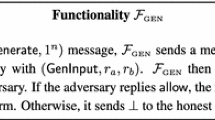Abstract
An efficient two party RSA secret key sharing generation scheme based on a homomorphic encryption, which is semantically secure under the prime residuosity assumption, is proposed in this paper. At the stage of computing RSA moduloN, an initial distributed primality test protocol is used to reduce the computation complexity and increase the probability ofN being a two-prime product. On the other aspect, the homomorphic encryption based sharing conversion protocols is devised and adopted in multi-party computing modulusN and secret keyd. Comparing to any sharing conversion protocols based on oblivious transfer protocol, the homomorphic encryption based sharing conversion protocols are of high performance. Our scheme resists the passive attack and since a method of verifying the sharing was introduced in, the scheme can resists any cheating behaviors too. Security proof, computation complexity and communication complexity analysis are given at last.
Similar content being viewed by others
References
Shamir A. How to Share a Secret [J].Communications of the ACM, 1979,22(11): 612–613.
Blakley G R. Safeguarding Cryptographic Keys [J].Proceedings of AFIPS 1979 National Computer Conference, 1979,48: 313–317.
Desmedt Y. Threshold Cryptography [J].European Transactions on Telecommunications. 1994,5(4): 449–457.
Cocks C. Split Knowledge of RSA Parameters [C]//Cryptography and Coding. Berlin: Springer-Verlag, 1997: 89–95.
Boneh D, Franklin M. Efficient Generation of Shared RSA Keys [C]//Proc of Crypto '97. Berlin: Springer-Verlag, 1997: 425–439.
Boneh D, Franklin M. Efficient Generation of Shared RSA Keys [J].Journal of the ACM, 2001,48(4): 702–722.
Gilboa N. Two Party RSA Key Generation [C]//Proceedings of the Crypto '99. Berlin: Springer-Verlag, 1999: 116–129.
Frankel Y, MacKenziei P D, Yun M. Robust Efficient Distributed RSA-Key Generation [C]//STOC ACM. New York: ACM Press, 1998: 663–672.
Wang H, Xiao H, Xiao G Z. Two-Party Shared RSA Key Against Cheater [J].Journal of Software, 2000,11(10): 1344–1347.
Naccache D, Stern J. A New Public Key Cryptosystem Based on Higher Residues [C]//Proc ACM Conference on Computer and Communications Security. San Francisco, California, Nov. 2–5, 1998: 59–66.
Derôme M F A. Generating RSA Keys without the Euclid Algorithm [J].Electronic Letters, 1993,29(1): 19–21.
Author information
Authors and Affiliations
Corresponding author
Additional information
Foundation item: Supported by the National Natural Science Foundation of China (60403027)
Biography: YANG Muxiang (1976-), male, Ph.D. candidate, research direction: secret sharing, digital signature.
Rights and permissions
About this article
Cite this article
Muxiang, Y., Fan, H., Minghui, Z. et al. Efficient and robust two-party RSA key generation. Wuhan Univ. J. Nat. Sci. 11, 1617–1620 (2006). https://doi.org/10.1007/BF02831834
Received:
Issue Date:
DOI: https://doi.org/10.1007/BF02831834




